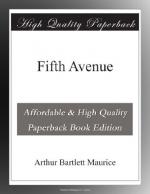From Italy McAllister went to spend the summer at Baden-Baden. The Prince of Prussia, later the Emperor William, was there. It pained the young American to find that the royal visitor was no connoisseur, gulping his wine instead of sipping and lingering over it. But there is haste to express intense admiration. “His habit of walking two hours under the trees of the Allee Lichtenthal was also mine, and it was with pleasure I bowed most respectfully to him day by day.” The final touch to the McAllister education came at Pau, where he passed the following winter, and the winter after. He ran down to Bordeaux, made friends with all the wine fraternity there, tasted and criticized, wormed himself into the good graces of the owners of the enormous Bordeaux caves, and learned there for the first time what claret was. “There I learned how to give dinners; to esteem and value the Coq de Bruyere of the Pyrenees, and the Pic de Mars.”
Thus equipped for the serious business of life as he conceived it, he returned home. He entertained old Commodore Vanderbilt at a dinner that caused the ex-Staten Island ferryman to remark: “My young friend, if you go on giving such dinners as these you need have no fear of planting yourself in this city.” He was at first disappointed at the reception accorded him by his native city of Savannah. He had prided himself on giving that town the benefit of his European education. But there was a certain resentment at his attitude until “I took up the young fry, who let their elders very soon know that I had certainly learned something and that Mc’s dinners were bound to be a feature of Savannah.” Then came his coup. Certain noble lords were expected from England, the son of the Duke of Devonshire and the son of the Earl of Shaftesbury, and all wondered who would have the honour of entertaining them.
The British Consul counted on the distinction. “He was a great character there, giving the finest dinners, and being an authority on wine, i.e., Madeira, ‘Her Majesty’s Consul will have the honour.’ I secretly smiled, as I knew they were coming to me, and I expected them the next day. This same good old Consul had ignored me, hearing that I had the audacity to give at my table filet de boeuf aux truffes et champignons. I returned home feeling sure that these young noblemen would be but a few hours under my roof before Her Majesty’s Consul would give me the honour of a visit.” He was right. The strangers had not been settled an hour when the tactful Briton rushed up the front steps. Throwing his arms around McAllister’s neck, he exclaimed: “My dear boy, I was in love with your mother thirty years ago; you are her image; carry me to your noble guests.” “Ever after,” is the naive record of our hero, “I had the respect and esteem of this dear old man.”
Let us get back to our sheep. The narrative has been rambling too far from Fifth Avenue, and it is with the arbiter of the Avenue that we have to do. Behold him launched, laughed at perhaps, occasionally, but feared and courted. He was at the ball given to the Prince of Wales in the Academy of Music, being the first after the royal guest to take the floor for the waltz.




